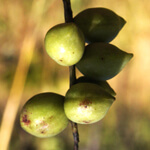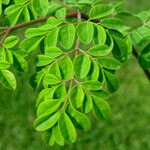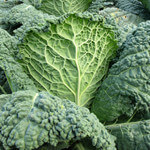 The kakadu plum, also called the gubinge, the billygoat plum, or the murunga, is a flowering plant native to Arnhem Land in northern Australia. Despite their name, the fruits of the kakadu plum plant – simply called kakadu plums – are more closely related to the almond than the plum, and they are unusual for fruits insofar as they remain on the plant after ripening. Australian Aborigines have treasured the plums for thousands of years due to their medicinal properties, although the fruits are not well-known outside of their native country.
The kakadu plum, also called the gubinge, the billygoat plum, or the murunga, is a flowering plant native to Arnhem Land in northern Australia. Despite their name, the fruits of the kakadu plum plant – simply called kakadu plums – are more closely related to the almond than the plum, and they are unusual for fruits insofar as they remain on the plant after ripening. Australian Aborigines have treasured the plums for thousands of years due to their medicinal properties, although the fruits are not well-known outside of their native country.
List of Health Benefits
World’s highest vitamin C concentration – Undoubtedly the kakadu plum’s greatest claim to fame is that it contains the highest vitamin C concentration of any food on Earth. Indeed, a report by the Australian Government’s Rural Industries Research and Development Corporation demonstrated that kakadu plums contain between 1,000 and 5,300 milligrams of vitamin C per 100 grams. This is approximately 100 times the vitamin C concentration of blueberries and oranges! Vitamin C is an important antioxidant that improves brain function and fortifies the immune system.
Phytochemical content – Kakadu plums contain rare phytochemicals such as ellagic and gallic acid. According to a study published in the March 2006 edition of Toxicological Sciences, gallic acid contains significant anti-inflammatory properties and can be used to treat inflammatory allergic diseases. Moreover, a study published in the January/February edition of Anticancer Research showed that ellagic acid can kill cancer-causing cells and lower estrogen’s role in contributing to breast cancer.
Skin benefits – Despite their relative obscurity as a whole food, kakadu plums (or rather, their extracts) are starting to become more common in international cosmetic products. This is because the fruits contain a large amount of trace minerals and antioxidants that nourish and invigorate the skin, including vitamin E, zinc, iron, folate, lutein, and the aforementioned vitamin C. Antioxidants like vitamins C and E are especially important for skin health because they neutralize cell-damaging free radicals, thereby guarding us from the premature aging effects associated with such damage.
Rich in calcium and magnesium – Kakadu plums contain respectable amounts of calcium and magnesium. The importance of calcium for building bones and teeth is well-known, but most people don’t realize that we also need magnesium to help us absorb that calcium. Since these fruits contain both, they are an excellent guard against osteoporosis and other bone-related conditions.
Natural laxative – Kakadu plums are rich in dietary fiber, a plant food that clears accumulated waste from the colon and induces intestinal peristalsis. This makes kakadu plums – like most fruits – a superb natural cure for constipation. Also, since fiber absorbs water from the colon, it also contributes towards a feeling of fullness. This fact, coupled with kakadu plums’ low calorie and fat content, makes them an effective weight loss food.
Research into Kakadu Plums Is Limited
Much like the Amazonian camu camu berry, with which this fruit shares a similar nutritional profile, research into the health benefits of kakadu plums is somewhat limited. Studies are few in number, and precise nutritional data on the fruit is difficult to find. Nonetheless, it’s pretty clear from the information we currently have that these plums are special. Let’s hope that, in time, the natural health world finally starts to take notice of this Australian superfruit.






